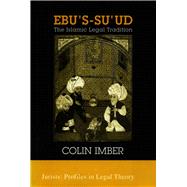Ebu'S-Su'Ud
, by Imber, Colin- ISBN: 9780804729277 | 0804729271
- Cover: Hardcover
- Copyright: 8/1/1997
The jurist Ebu's-su'ud (c. 14901574) occupies a key position in the history of Islamic law. For forty years, he held the senior judicial position in the Ottoman empire, most of this time serving under the Sultan Suleiman I, known in the West as "the Magnificent." The Ottomans, however, remembered the Sultan as "the Lawgiver," emphasizing that it was above all the legal order of his reign that they admired. The central figure of this order was Ebu's-su'ud. The Ottoman concept of the ideal law was traditional Islamic law, the shari 'a. However, the problem was that the shari 'a was in many respects impractical and had always, of necessity, coexisted with secular systems of law. An Ottoman tradition, which began in the seventeenth century and which modern historians often reiterate, asserts that during the reign of Suleiman I, Ebu's-su'ud succeeded in harmonizing the secular law with the shari 'a, creating, in effect, a new ideal Islamic legal system. This book examines the validity of this assertion. The author begins by choosing five areas of Islamic law for analysis: the Sultan and legal sovereignty; land tenure and taxation; trusts in mortmain; marriage and the family; and crimes and torts. In each of these areas, he first lays out the most important rules and concepts in the Islamic juristic tradition, and then gives his translations of a selection of Ebu's-su'ud's writings on the topic in question, with a brief analysis. From these materials, the author suggests that readers draw their own conclusions as to whether Ebu's-su'ud did indeed reconcile Ottoman secular legal practice with the sacred law. This way of presenting the material is done for two reasons. The first is that Ebu's-su'ud's texts (which are inaccessible to most people, either linguistically or because they exist only in manuscript) are made available in translation, so that readers can agree or disagree with the author's conclusions. The second reason is to present a wide array of previously unavailable sources to encourage further research in the study of Islamic and Ottoman law, demonstrating that the careful, detailed examination of these and other related sources can illuminate important areas of Ottoman law and Islamic history.






